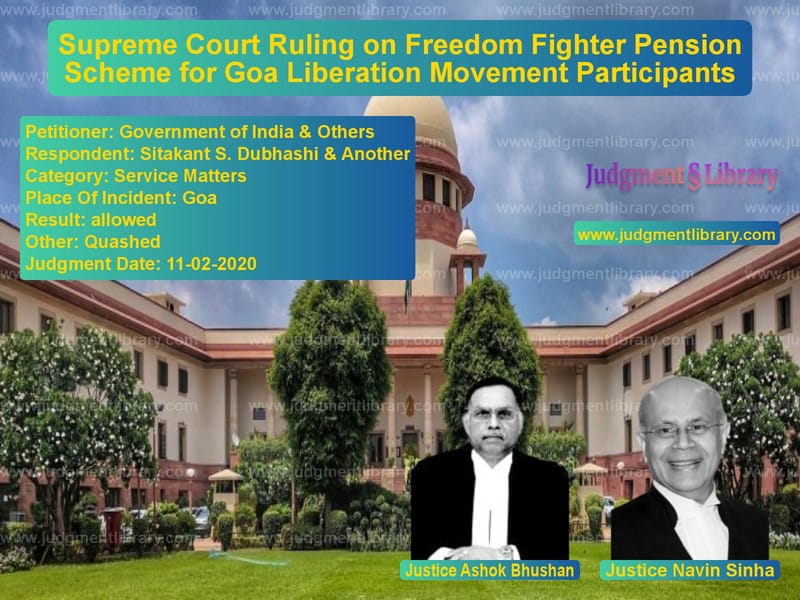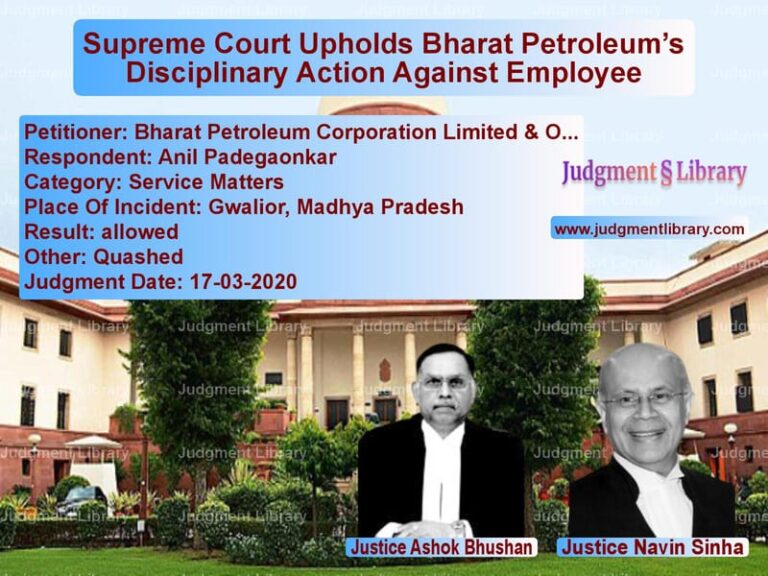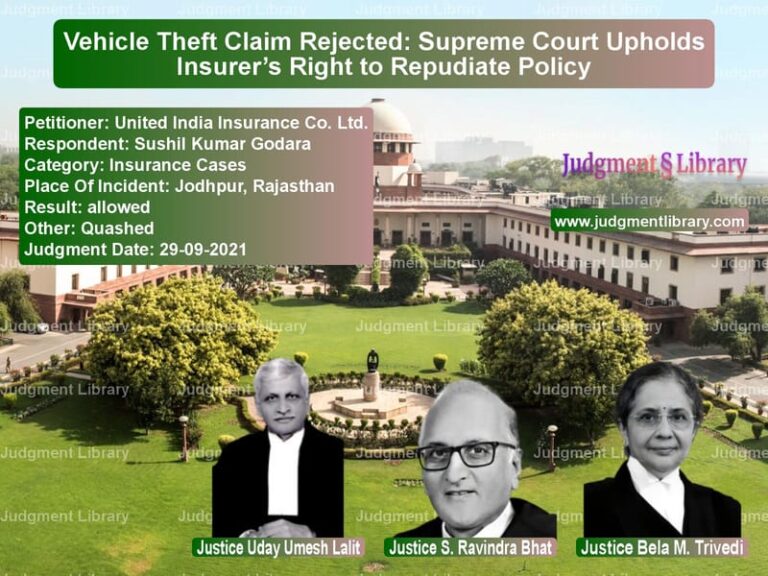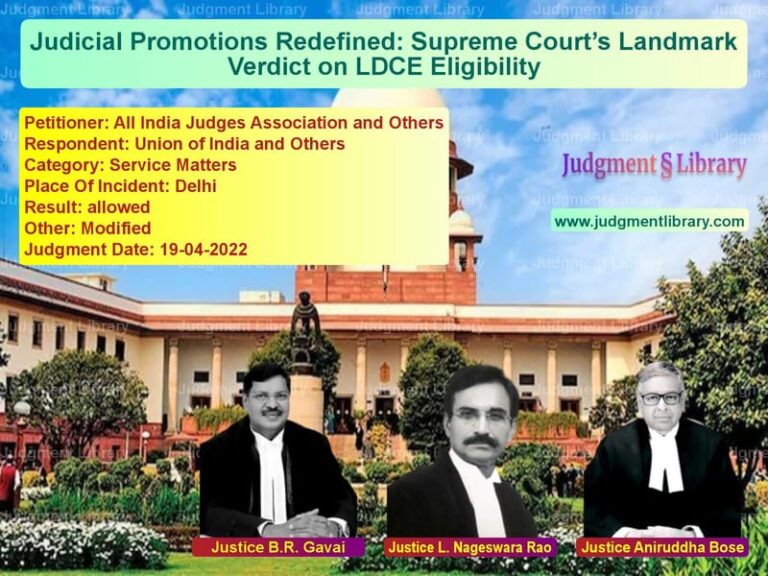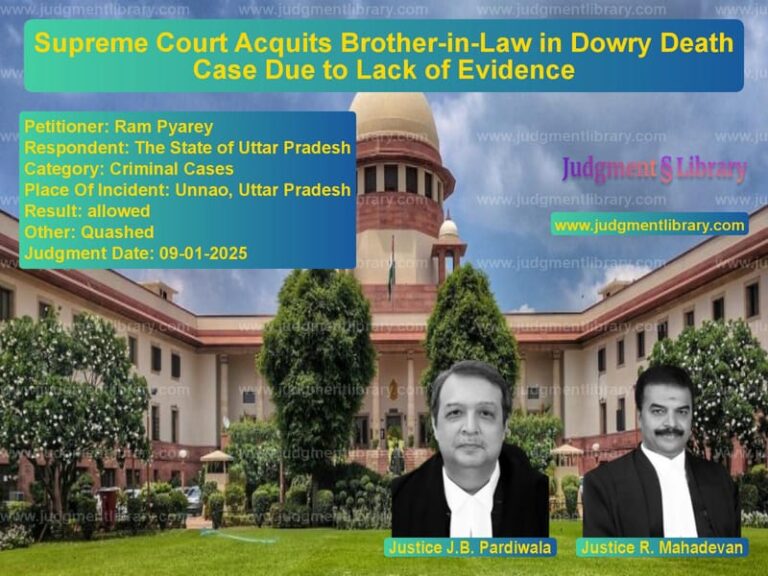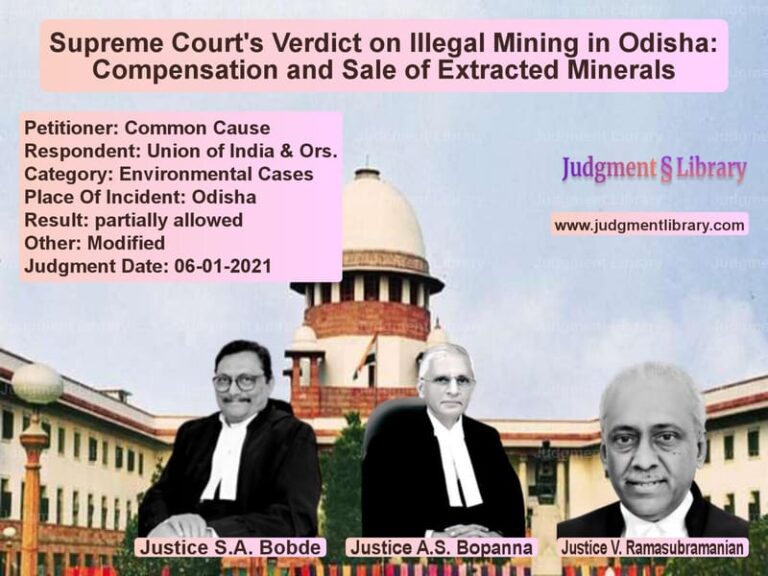Supreme Court Ruling on Freedom Fighter Pension Scheme for Goa Liberation Movement Participants
The Supreme Court of India, in the case of Government of India & Others v. Sitakant S. Dubhashi & Another, addressed a dispute regarding the eligibility of a participant in the Goa Liberation Movement under the Swatantrata Sainik Samman Pension Scheme, 1980 (SSSP Scheme). The judgment focused on the applicability of the cut-off date set by the government for granting pension benefits.
Background of the Case
The respondent, Sitakant S. Dubhashi, had applied for the Swatantrata Sainik Samman Pension (SSSP) under the scheme extended to participants of the Goa Liberation Movement Phase-II (1954-55). His application, however, was rejected by the Government of India, citing that he was not in receipt of State Pension by August 1, 2002, which was a mandatory requirement under the scheme.
Following multiple representations, the respondent challenged the government’s decision before the High Court of Bombay at Goa, which ruled in his favor. The Government of India then filed an appeal before the Supreme Court.
Key Legal Issues
- Was the cut-off date of August 1, 2002, a valid eligibility criterion under the SSSP Scheme?
- Did the respondent fulfill the necessary conditions for pension eligibility?
- Was the High Court correct in ruling that the cut-off date was arbitrary and should not apply?
Arguments by the Parties
Arguments by the Appellant (Government of India)
- The Government extended the SSSP Scheme to Goa Liberation Movement participants in 2003 with the condition that only those who were receiving State Pension as of August 1, 2002 were eligible.
- The respondent was granted State Pension only in 2008, making him ineligible under the scheme.
- The cut-off date was introduced to ensure fairness and prevent an indefinite extension of pension benefits.
Arguments by the Respondent (Sitakant S. Dubhashi)
- The respondent had applied for State Pension in 2001, but his claim was initially rejected.
- He was later recognized as a freedom fighter and granted State Pension from December 1, 2007, proving that he was eligible all along.
- The cut-off date of August 1, 2002, was arbitrary and lacked any reasonable basis.
Supreme Court’s Observations
The Supreme Court, comprising Justices Ashok Bhushan and Navin Sinha, examined the rationale behind the cut-off date and its applicability to the respondent’s case.
1. Validity of the Cut-off Date
The Court found that the Government of India had deliberated extensively before setting the cut-off date. The Court stated:
“The scheme was not an open-ended initiative, and the eligibility conditions were framed after careful consideration. The cut-off date of August 1, 2002, was set to ensure administrative efficiency.”
2. Eligibility of the Respondent
The Court noted that while the respondent had applied for State Pension in 2001, he was only granted it in 2008. The Court held:
“The fact that he was granted pension in 2008 does not automatically make him eligible for the SSSP Scheme, which explicitly required receipt of pension by August 1, 2002.”
3. High Court’s Error in Judgment
The Court ruled that the High Court was incorrect in striking down the cut-off date as arbitrary. It emphasized that:
“When a policy decision has been made through a structured process, courts should not intervene unless there is clear evidence of irrationality or unfair discrimination.”
Final Judgment
The Supreme Court allowed the appeal and set aside the High Court’s judgment. It ruled that:
- The cut-off date of August 1, 2002 was valid and binding.
- The respondent’s claim for pension under the SSSP Scheme was rightfully rejected by the Government of India.
- The government was not obligated to grant pension benefits beyond the eligibility criteria set in 2003.
Key Takeaways
- Government schemes can have cut-off dates to ensure administrative efficiency.
- Courts should not interfere in policy decisions unless they are manifestly arbitrary or discriminatory.
- Freedom fighter pensions are governed by specific eligibility criteria, which must be adhered to.
- Delay in pension approval does not grant retrospective eligibility under new schemes.
Conclusion
The Supreme Court’s ruling in Government of India & Others v. Sitakant S. Dubhashi & Another reinforces the principle that eligibility conditions in government schemes must be respected. By upholding the validity of the cut-off date, the Court ensures consistency in the administration of the SSSP Scheme and prevents retrospective claims that could disrupt the scheme’s structure.
Petitioner Name: Government of India & Others.Respondent Name: Sitakant S. Dubhashi & Another.Judgment By: Justice Ashok Bhushan, Justice Navin Sinha.Place Of Incident: Goa.Judgment Date: 11-02-2020.
Don’t miss out on the full details! Download the complete judgment in PDF format below and gain valuable insights instantly!
Download Judgment: Government of India vs Sitakant S. Dubhashi Supreme Court of India Judgment Dated 11-02-2020.pdf
Direct Downlaod Judgment: Direct downlaod this Judgment
See all petitions in Pension and Gratuity
See all petitions in Public Sector Employees
See all petitions in Recruitment Policies
See all petitions in Judgment by Ashok Bhushan
See all petitions in Judgment by Navin Sinha
See all petitions in allowed
See all petitions in Quashed
See all petitions in supreme court of India judgments February 2020
See all petitions in 2020 judgments
See all posts in Service Matters Category
See all allowed petitions in Service Matters Category
See all Dismissed petitions in Service Matters Category
See all partially allowed petitions in Service Matters Category

